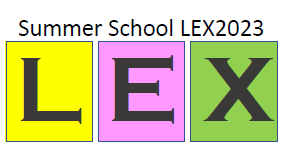LEX2023 will be released in blended modality: in presence for 25 sites and online (max 50).
The school aims at providing knowledge of the most significant ICT standards emerging for legislation, judiciary, parliamentary and administrative documents. The course provides an understanding of their impact in the different phases of the legislative and administrative process, awareness of the tools based on legal XML standards (Akoma Ntoso, LegalRuleML) and their constellations (Ontology, UNDO), and the ability to participate in the preparation and use of standard-compliant documents throughout the law-making process. In particular, we would like to create consciousness in the stakeholders in the legal domain about the benefits and the possibilities provided by the correct usage of the Semantic Web technologies like XML standards, ontologies, and natural language techniques applied to the legal text, legal knowledge modelling and reasoning.
This edition LeX Summer School is organized into three courses:
- A Basic Course providing an introduction to the XML web technologies and the basic level of the technologies for drafting and managing standard-compliant legislative and legal documents;
- An Advanced Course on the higher levels of the semantic web technologies as applied to the legal domain: modelling modifications, procedures and legal knowledge.
- An Akoma Ntoso Developers Workshop for diving into technical solutions, editors, portals, and the framework used for marking up in Akoma Ntoso.
LeX is an intensive, 6-day program, 8 hours for a day, that requires participants’ total dedication and intellectual commitment.
As pre-work the pupils have to read the following books:
- “Legislative XML for the Semantic Web”, Edited by Mariangela Biasiotti, Enrico Francesconi, Monica Palmirani, Giovanni Sartor, Springer, 2011.
- Legislative XML: principles and technical tools, Monica Palmirani, Aracne, 2012.
http://www.aracneeditrice.it/aracneweb/index.php/pubblicazione.html?item=9788854856257
The program’s learning process assists participants to develop both knowledge, skills and capabilities in using and managing shared or interoperable standards for legislative documents enabling access, communication, processing, modelling, representing an integration of legislation through IT technologies, in an open and cooperative framework.
